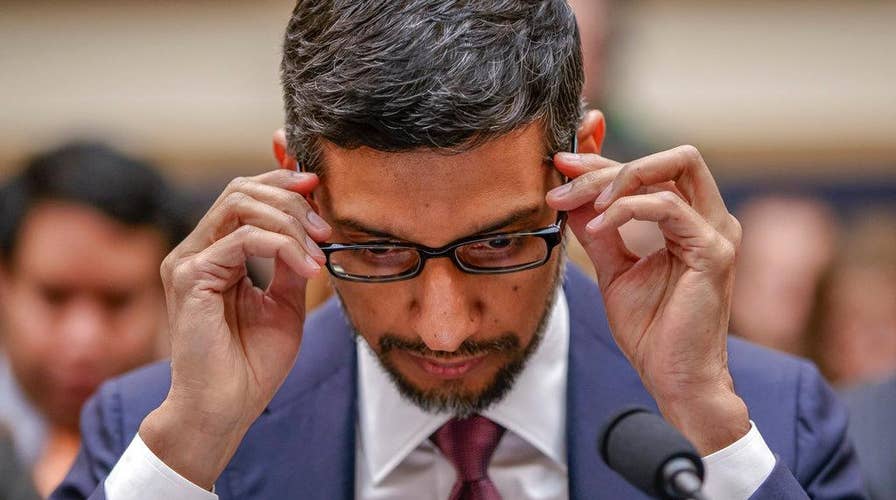Speaking in front of the House Judiciary Committee on Tuesday amid allegations of anti-conservative bias and privacy violations on the platform, Google CEO Sundar Pichai said the company had "no plans to launch search in China."
Pichai responded to Congresswoman Jackson Lee's (D.-Tx.) question when she said she was concerned about the company's controversial Project Dragonfly and asked what the company is doing to minimize the efforts.
The Google CEO said: "Right now, we have no plans to launch [a search product] in China," adding that "getting access to information is an important human right."
GOOGLE CEO SUNDAR PICHAI TESTIFIES BEFORE HOUSE COMMITTEE -- LIVE BLOG
Google has not yet responded to a request for comment on whether Pichai's comments signaled a new stance for the Mountain View, Calif.-based company or whether they were in line with the company's previous statements.
The search giant has typically couched its words about any potential Chinese search engine very carefully.
In October, speaking at a Wired tech conference, Pichai was asked whether Google could operate in China and if so, what would it look like. He answered the question by saying that the company would be able "to serve well over 99 percent of the queries there are many, many areas where we would provide information better than what's available."
At the Wired conference, he expanded upon that by touching on areas such as cancer treatments and said Google could help provide useful information instead of fake treatments.
"So things like that, you know, weigh heavily on us, but we want to balance it with you know with what the conditions would be," Pichai said "So we haven't made ...it's very early. We don't know whether we would or could do this in China, but we felt it was important for us to explore."
REPORT REVEALS GOOGLE IS TRACKING YOU IF YOU LIKE IT OR NOT
Heat from the inside and outside
The search giant, owned by internet holding company Alphabet, has come under considerable scrutiny, both internal and external, about its intentions for the search engine, internally known as Project Dragonfly, which would be app-based, and any perception that it would be kowtowing to the Chinese government's demands for censorship.
On Tuesday, a human rights group issued a letter to Pichai and the company asking them "to drop Project Dragonfly and any plans to launch a censored search app in China, and to re-affirm the company's 2010 commitment that it won't provide censored search services in the country. The letter was first reported by The Intercept, which first broke the news of the potential search engine.
In remarks made at the Hudson Institute in October, Vice President Mike Pence specifically called out Google by name and said it should abandon the project. "More business leaders are thinking beyond the next quarter, and thinking twice before diving into the Chinese market if it means turning over their intellectual property or abetting Beijing’s oppression," Pence said in his prepared remarks. "But more must follow suit. For example, Google should immediately end development of the 'Dragonfly' app that will strengthen Communist Party censorship and compromise the privacy of Chinese customers…"
In August, Google employees revolted over the controversial project, with more than 1,000 of them writing a letter to company management expressing their displeasure with the proposed search engine. Employees demanded that the company be more transparent about its decisions. The letter also called the project's ethics into question.
Following the letter from its own employees, more than a dozen human rights groups sent a separate letter, calling on the search giant to abandon its controversial initiative. Organizations such as Amnesty International, Human Rights Watch and Reporters Without Borders wrote to CEO Pichai that complying with Chinese censorship would represent "an alarming capitulation by Google on human rights."
"The Chinese government extensively violates the rights to freedom of expression and privacy; by accommodating the Chinese authorities' repression of dissent, Google would be actively participating in those violations for millions of internet users in China," the letter said.
In September, several employees reportedly quit their jobs over the project, citing a lack of accountability and transparency at the company.
Fox News' Christopher Carbone contributed to this report. Follow Chris Ciaccia on Twitter @Chris_Ciaccia









































